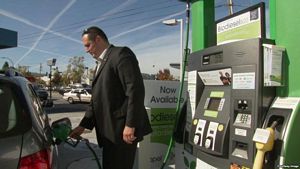|
By accessing or using The Crittenden Automotive Library™/CarsAndRacingStuff.com, you signify your agreement with the Terms of Use on our Legal Information page. Our Privacy Policy is also available there. |

Algae Could Fuel Cleaner Road to Future
|
|---|
|
|
Algae Could Fuel Cleaner Road to Future
Jan Sluizer, VOA News
20 September 2013 (10:03AM)
 A motorist fuels up on algae-based biodiesel during a month-long test run of the product in the San Francisco Bay area. (Courtesy Solazyme) A motorist fuels up on algae-based biodiesel during a month-long test run of the product in the San Francisco Bay area. (Courtesy Solazyme)
|
SAN FRANCISCO — Richard Battersby knows alternative vehicle fuels. As fleet director at the University of California-Davis, he has replaced gasoline-powered cars with hybrid and electric ones, as well as with vehicles that run on compressed gas or biodiesel.
He is especially excited about biodiesel, which he says could help wean America off foreign oil.
“It may not seem as big of an impact, but when you’re talking about potentially millions or billions of gallons in the United States, even a five percent reduction or a 20 percent reduction, is significant," Battersby said. "So, the more of the bio part of the biodiesel that we can bring in, the better off our nation is.”
The use of alternative fuels is growing in the United States. About twice as many electric vehicles were sold in the first half of 2013 compared to the first half of 2012, and sales of hybrid cars continue to rise. Since 2005, the federal government has required refiners to add ethanol - usually from corn - to gasoline.
Biological sources
Diesel made from a biological source like soybeans or corn oil, or used cooking oil from restaurants, is an important part of the alternative fuel mix.
Algae is another promising source of biodiesel fuel. Among the American companies making biodiesel is Propel Fuels, based in Redwood City, California.
“We think the key to transformation in the United States to changing the fuel mix is engaging those consumers, giving them options, educating them about fuels, and then people take care of the rest," said Matt Horton, CEO of Propel Fuels. "What Propel’s really about is giving people new choices. Bringing new kinds of fuels, alternative fuels, cleaner fuels to retail stations everywhere."
Propel products are available at 29 gas stations nationwide. Last year, it partnered with Solazyme, another local company with similar goals and philosophy. For 10 years, Solazyme has been working to find replacements for petroleum. Bob Ames, the company’s vice president in charge of fuels, says what they’ve come up with is unique.
“It all starts in the lab where what we do is we grow a proprietary strain of algae that are actually optimized to produce an oil that is a perfect oil, an algae oil, to make into fuel,” Ames said.
Algae oil technology
Solazyme has patented its algae-oil technology. Ames says the possibilities for the fast-growing aquatic plant are just beginning to be discovered, but Solazyme is especially excited about its algae-derived fuel because of its environmental benefits.
“It’s significantly cleaner," Ames said. "So, things like the particulate matter, the black soot coming out the back of a diesel pipe, that’s significantly reduced when you use an algae-based fuel.”
To test its marketability, Propel installed algae-based fuel pumps at four of its seven stations in the San Francisco Bay area. It was the first time Solazyne’s new biodiesel was offered to the public. The companies were pleased to see a 35 percent increase in biodiesel sales over the month-long test-run.
“Basically, it was offered at exactly the same price as the competing fuel, and what consumers told us by buying more of it is that they were willing to buy it because of the better environmental benefits,” Ames said.
Coming down to economics
Horton says the technology is ready, the fuel works, and consumers want it. A plus for algae is that it can be densely grown. So what’s the problem? Horton says it comes down to economics.
“You have to be able to produce these fuels in very, very large quantities to drive the prices down so that they are competitive,” he said.
Large quantities of Solazyme’s algae oil are being produced at its plant in Peoria, Illinois, as well as at a much smaller facility near San Francisco. A much larger facility expected to be in operation by the end of the year is currently under construction in Brazil in partnership with a Brazilian company.
Battersby is watching closely because during Solazyme and Propel’s 30-day experiment, algae-based fuel was also available for the diesel-powered vehicles at U.C. Davis. Battersby says drivers reported that it worked just fine.
“Solazyme has definitely set the bar very high," he said. "They’ve had spectacular success, and if they continue to grow the business as they seem to be, I think we’ll see algae-based biodiesel on retail pumps within the next five or 10 years.”
While no one expects algae to replace petroleum, those who believe in its potential say it could help put the world on a cleaner, more energy efficient road to the future.

















 A motorist fuels up on algae-based biodiesel during a month-long test run of the product in the San Francisco Bay area. (Courtesy Solazyme)
A motorist fuels up on algae-based biodiesel during a month-long test run of the product in the San Francisco Bay area. (Courtesy Solazyme)
